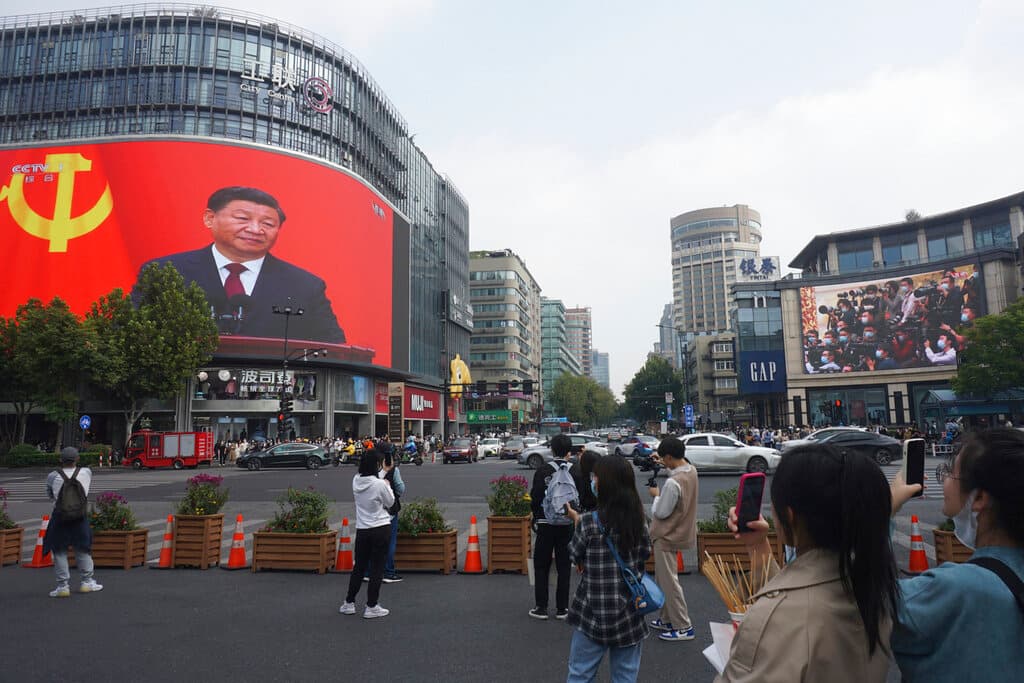Even as Xi Consolidates Power, He Threatens China’s Prosperity
Outsiders are highly skeptical of Beijing’s economic statistics, which is why the markets ignored them in today’s selloffs. The country’s economic outlook seems grim to many.

Judging by how the world’s markets seem to be reacting to yesterday’s re-coronation of Xi Jinping as Beijing’s strongman, capitalists don’t trust strict communism.
Even though Beijing boasted a better than predicted growth rate, companies tied to China saw their stocks fall sharply when markets opened Monday morning. BABA, the stock of Amazon’s Chinese equivalent, Alibaba, dropped by nearly 15 percent at midday. Year to date, the stock has lost 50 percent of its value. Other New York-traded Chinese companies saw a similar nosedive today, with some losing as much as 40 percent of their values.
Beyond tech stocks, investors also fled from American companies that are tied to the Chinese economy, including Sands, which operates casinos at Macau, and iShares China Large-Cap ETF, which specializes in Chinese investments. The yuan was down, the markets at Shanghai and Hong Kong were down, and the rest of Asia’s indexes marked major losses with most anything related to Beijing.
Markets, of course, often overreact to world events. Then again, stock markets are predictive: Investors like to sell assets before bad news hits the headlines. Yet, that Mr. Xi was tightening the Communist government’s grip over the Chinese economy was far from an earth-shaking piece of news to even the most casual Beijing observer.
So perhaps investors are spooked by the manner in which Mr. Xi chose to demonstrate his newly acquired powers. Specifically, one of his predecessors, Hu Jintau, was whisked out of the hall where the Communist Party conducted its convention over the weekend.
Beijing’s state-controlled news agency, Xinhua, reported that the 79-year old Mr. Hu was “not feeling well.” Yet, since Beijing communists rarely display such frailty in public, the ejection, in full view of the cameras, seemed staged for public consumption. Mr. Hu briefly attempted to turn to Mr. Xi for clemency, but the boss appeared to shake his head dismissively, a scene that looked like a clip from “The Godfather.”
In the movie, a former family ally, Tessio, realizes that Michael Corleone knows all about his betrayal and is about to execute him. Turning to the consiglieri, Tom Hagen, Tessio says, “Can you get me off the hook, Tom? For old times’ sake?” Shaking his head, Hagen sympathetically answers, “Can’t do it, Sally.”
Unlike Sal Tessio, Mr. Hu may not have been escorted to a gruesome death in a waiting car — but the former party boss’s whereabouts are unknown. His betrayal: As the leader of a political group known as the Shanghai Gang, Mr. Hu has expressed reservations about erasing the rule that had limited the Communist Party chairmanship to two five-year terms. Striking that rule, which was enacted in the aftermath of Mao’s chairmanship, facilitated Mr. Xi’s crowning on Sunday.
Under Mr. Hu’s leadership, which ended in 2013, the Chinese economy became freer, as entrepreneurs were allowed to acquire wealth and innovate. Political expression and free association remained verboten, but as some market-based policies were enacted the Chinese economy grew by leaps and bounds.
In recent years Mr. Xi — himself a former member of Mr. Hu’s Shanghai Gang — started purging political rivals from power positions. At the same time, he tightened Beijing’s hold over all economic levers. Voices of innovators like the Alibaba founder, Jack Ma, were muzzled and the government assumed control over their companies.
Several sources have told the Sun that the complete shutdown of Shanghai activities for two months under Mr. Xi’s “zero Covid” policy earlier this year had an additional purpose beyond the misguided attempt to forcefully eliminate the pandemic: By freezing economic activity at a city that had acquired too much power and wealth for his taste, the strongman clipped the wings of his would-be competitors.
Mr. Xi had by then installed a loyalist, Li Qiang, as Shanghai’s party boss, further tightening his grip over the country’s top financial center. During the weekend’s CCP-fest, Mr. Li was picked as the top member of the powerful five-man politburo. He is slated to become the new prime minister, overseeing all economic policies.
As the party was gathered, the government delayed publishing economic data, including growth numbers for the third quarter. Today it announced that between July and September the economy expanded by 3.9 percent compared to last year. The number, better than the expected 3.4 percent growth, seemed like a gift to Mr. Xi.
In reality, outsiders are highly skeptical of Beijing’s economic statistics, which is why the markets ignored them in today’s selloffs. The country’s economic outlook seems grim to many.
Among the factors that threaten Mr. Xi’s hope of overcoming America as the world’s largest economy is an aging Chinese population, high unemployment for people under the age of 30, a major real estate bust, and geopolitical pressures that threaten a slowdown in global economic activity.
Yet, the most significant threat to China’s prosperity comes from Mr. Xi himself. It is well known that a modern economy cannot thrive under strict Leninism. The man who plans to tighten his grip on power for the next five years and beyond is intent on rejecting any Chinese innovation or entrepreneurship. No wonder capitalists are fleeing his Xiconomics.

